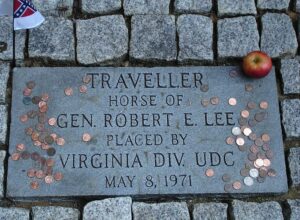Summary: Robert E. Lee saved Washington College (now Washington & Lee) in the aftermath of the Civil War, yet the University discontinued the practice of honoring him on Founders’ Day. Lee–along with George Washington–deserves to be remembered and properly honored at the place he saved and transformed. W&L needs to restore Founders’ Day.
The woke leadership of Washington & Lee (W&L) has largely erased Robert E. Lee from campus. Yet without Lee’s historic service as president of the college from 1865 until his death in 1870, the University very likely would not exist today, and would certainly not have established its long-standing legacy of honor and academic excellence.
In the summer of 1865, Washington College had been devastated by four years of war. The campus had been pillaged and heavily vandalized by Union Army troops. Enrollment was down to about forty students. Yet within a very short time of his arrival, Lee increased the student body to over four hundred students and attracted major philanthropic gifts (from both North and South) which permanently fortified the college’s financial condition.
Lee was a major educational innovator as president. He revamped the curriculum, adding courses in modern language (French, Spanish, and German), journalism, science, engineering, business, and law. He wanted the students to acquire the practical knowledge they would need to rebuild the decimated Southern economy.
W&L’s other namesake, of course, is George Washington, who made a major gift to the school in 1796. Washington’s gift of stock in the James River Canal Company was at the time the largest philanthropic gift in North America. In appreciation of his generosity, the school was named Washington Academy (and later Washington College).
The W&L Board of Trustees “Discontinued” Founders’ Day
W&L used to honor George Washington and Robert E. Lee on Founders Day in appreciation of their critical roles in making W&L the successful university that it is today. The tradition of Founders’ Day began shortly after Lee’s death in 1870 and continued uninterrupted until 2021.
When conflict erupted over Lee’s statues in Charlottesville and Richmond, Lee was falsely labeled a defender of slavery and a white supremacist. Following the death of George Floyd, rioting and violence consumed America.
The University came to view Lee (and Washington to a lesser degree) as a liability rather than an asset. They sought to distance W&L from its Founders and took steps to erase Lee from the campus.
Images of Lee and Washington were quietly removed from Lee Chapel.
Then, in June of 2021, the Board of Trustees voted to discontinue Founders Day. W&L would no longer pay tribute to the remarkable legacies of George Washington and Robert E. Lee.
But that was just the start. They renamed Lee Chapel—the chapel that Lee built while president of the school and which now serves as Lee’s final resting place—and they built a wall to block the famous Recumbent Statue of Lee from public view.
They eliminated the images of Lee and Washington from diplomas.
They even removed the grave marker honoring Lee’s famous horse Traveller.

A growing number of alumni and supporters pushed back. The University had gone too far.
Most reasonable people agree that the University overreacted. George Washington and Robert E. Lee are incredible assets—not liabilities—to W&L’s unique brand and culture. They deserve to be recognized, remembered, and honored.
Is It Necessary to Apologize for Robert E. Lee?
There’s no need for us to apologize for our Founders, but we do need to do a better job telling their stories, particularly the story of Robert E. Lee. Lee was opposed to slavery, calling it “a moral and political evil.” He was also adamantly opposed to secession before the Civil War, and wrote extensively of his personal hope that war could be avoided and that the Union could be preserved.
When Abraham Lincoln announced plans to raise an army of 75,000 men to invade the South to put down the rebellion, Lincoln wanted Lee to command the invading force. But Lee was from one of the most prominent families in Virginia. The thought of leading a military invasion against his family and friends was completely unacceptable to Lee.
Lee politely declined Lincoln’s offer, saying that he could not raise his sword against his home state of Virginia. When he turned down Lincoln’s offer, Lee said that, if he owned all the slaves in the South, he would give up every one of them to save the Union. Claims that Lee fought “to defend slavery” are completely baseless.
The simple truth is that Lee could not take part in an invasion of his home state of Virginia and felt it was his duty to defend it. He resigned from the US Army and committed himself to defending Virginia. He was a reluctant warrior, a tragic figure compelled to fight in a war he never wanted.
In the four years that followed—from 1861 to 1865—Lee emerged as one of the greatest military leaders in history. He faced overwhelming odds, outnumbered by a Union Army with vastly superior resources.
Through it all, Lee’s example of character and honor inspired not just the respect and admiration—but the love—of those who served under him. His men came to not only love him but to idolize him.
Robert E. Lee: The Embodiment of Character and Honor
I’ve often asked, what was it about Lee that inspired that love and devotion?
Simply put, it was his character. Lee’s character traits—humility, courage, kindness, charm, piety, honor, and integrity—made him an ideal role model. He was the man that every Southern male aspired to be, and the son that every Southern mother hoped to raise. He was the very embodiment of virtue.
As great as Lee’s military record was, his greatest legacy was arguably as an educator and peacemaker after the war. He became a leading voice for reconciliation between the North and South and devoted his final years to reuniting our war-torn nation. He turned down many lucrative offers of employment, earning a modest income as president of Washington College.
As an educator, Lee was innovative. The practical curriculum that he put in place–classes on modern language, journalism, science, engineering, business, and law–served as a model for higher education in his day. He inspired the student-administered Honor Code. When students asked him what rules he had for the college, he replied, “Young gentlemen, we have no printed rules. We have but one rule here, and it is that every student must be a gentleman.”
He was the very definition of a gentleman and always led by example. In our bitterly divided post-war nation, he became a leading voice for reconciliation, encouraging his former Southerners to bury the hatchet and pledge their allegiance to their former foe, the United States of America.
He devoted the last five years of his life to educating the young men of the South, which had been utterly devastated by four years of war. Lee wrote, “I have led the young men of the South in battle; I have seen many of them die on the field; I shall devote my remaining energies to training young men to do their duty in life.”
Most importantly, Lee left his stamp on the University through his remarkable character. His example of honor, civility, and Christian virtue has impacted generations of W&L students and remains an essential part of W&L’s culture to this day.
In recent years, though, Lee has been unfairly targeted by a woke cancel culture that seeks to erase and rewrite American history. And now, even Washington and Lee University—the school that he saved from oblivion—has turned its back on him.
Conclusion: W&L Must Remember and Honor Its Founders
W&L has been blessed to be directly connected to two of the greatest men of character in American history in George Washington and Robert E. Lee. They are an essential part of W&L’s identity—key elements of W&L’s unique brand—and it is the duty of alumni and other supporters today to make sure that W&L’s namesakes are rightfully remembered and honored.
Now more than ever, America needs heroes. Men of virtue, honor, and character—men like Lee—whose examples might inspire and shape today’s youth. But as statues are toppled and history is rewritten by America-hating radicals, our heroes and the ideals they represent are rapidly fading.
A growing number of W&L alumni are pushing back against the woke insanity in Lexington. One such organization is The Generals Redoubt, which has raised millions of dollars and built a following of several thousand donors and supporters. They are leading the charge to restore normalcy on campus, and they invite you to join them in this critical fight.
The Generals Redoubt and their supporters are sending a loud and clear message to the leadership of W&L that Founders’ Day must be restored, and that there is no shame in celebrating W&L’s Founders and namesakes: George Washington and Robert E. Lee.
To support The Generals Redoubt, visit their website at https://thegeneralsredoubt.us/
Gib Kerr is the author of States of Rebellion and the upcoming book Uncancelling Robert E. Lee: An Open Letter to the Board of Trustees at Washington and Lee to be published by Bombardier Books in May of 2024. Visit his website at gibkerr.com.

